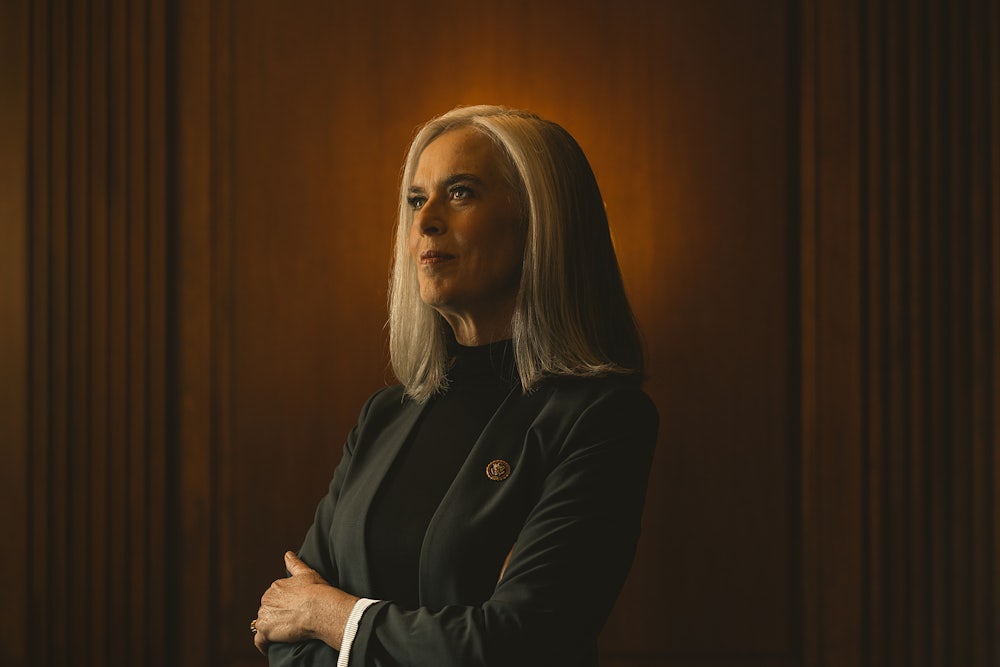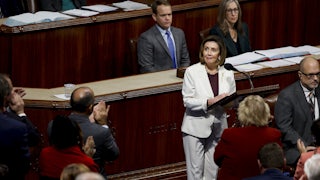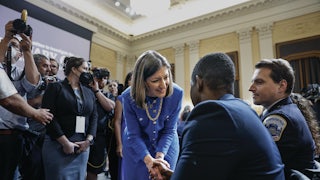November 1 was, by Representative Katherine Clark’s standards, a perfect day in the life of a legislator. The Massachusetts Democrat began her public appearances that afternoon at a child development lab and day care in suburban Boston, reading to toddlers and admiring their art projects as she made her case for universal childcare and paid family leave. It ended in the same spirit, at a small forum with progressive business owners in Boston—no babies this time, but discussing, once again, the need for an expanded safety net for families and working parents.
The November midterms were a week away, but Clark wasn’t really campaigning. She would wallop her GOP challenger the following Tuesday by almost 48 points. Instead, her mind was fixed on another election: Democrats’ leadership contests, in which House Speaker Nancy Pelosi and her top deputies were expected to step aside. “I love to brag that I’m the second-highest–ranking woman to Nancy Pelosi,” Clark told the business owners at the forum that night. She wouldn’t dare say aloud what she expected to be after the November elections: the very highest.
There’s nothing historic about Clark’s ascent to her caucus’s number two slot, minority whip, which she secured in late November. That distinction belongs to Hakeem Jeffries, the Brooklyn-based Democrat who became the first Black lawmaker to lead a party in Congress. But being the first woman to follow in Pelosi’s stilettos carries its own significance—albeit a subtle one, much like Clark herself. Pelosi rose through the ranks in an era of shoulder-padded feminism, when women broke the glass ceiling by playing a man’s game in a man’s world. Clark, meanwhile, has staked her political career on femininity, both by raising up the traditionally women-centric issues of childcare and paid family leave and in how she leads—a quieter, more collaborative approach, a sort of anti-Lean In. (No shade to the prior generation, of course: “Speaker Pelosi is iconic,” Clark told me. “She has opened the door for so many of us to come in, and mold leadership and our own styles and new traditions that we can set for Congress.”)
Pelosi stepped away from the speakership after the November midterms, announcing to her colleagues that “the hour’s come for a new generation to lead.” In contrast to the messy, public fights among their Republican counterparts, Democrats pulled off a bloodless changing of the guard. And thanks to her uncontested campaign to become whip, will Clark, a Pelosi protégé and a master of congressional Kremlinology, really represent much of a new direction? “We know that when women are at the leadership table, in leadership roles, those priorities do change,” Clark told me. “Nancy Pelosi is a master of the legislative process.”
“That leadership style is one that I am going to model and work from as I make my own path.” The more things change, the more they stay the same.
Being a working mother defined Katherine Clark’s political career. She prosecuted cases on behalf of child victims as a young lawyer and worked for Massachusetts’s Office of Child Care Services after she earned a public policy degree from Harvard. Clark entered politics the way mothers often do: running for school board. That led to a couple of terms in the Massachusetts statehouse. When Ed Markey replaced John Kerry in the Senate, she won his congressional seat in a 2013 special election. Clark joined the House about a year after Jeffries and one year ahead of California’s Pete Aguilar, the last member of Democrats’ new House leadership trifecta.
Clark’s legislative portfolio reflects that career as well as her lived experience, which are often intertwined: universal childcare, paid family leave, and maternal health. She’s a strident advocate for abortion rights because she suffered a miscarriage—and the care she received for it has become harder to access in a post-Roe world. She’s been squashed in the sandwich generation, raising her three teenagers as she took care of a mother with Alzheimer’s and a father who suffered a stroke. Returning home from Washington each week forced a painful choice: relieve her husband from parental duties or check in on her parents—to remind her mother, yet again, why her father could no longer communicate with her? “I remember literally sitting in the driveway—my parents lived next door—and not knowing which house to go into,” she recalled. “When I look at women’s leadership in Congress, those experiences matter.”
Indeed, Clark set herself to cultivating a gang of such leaders when she got to Congress. She and five other House Democratic women call themselves “the Pink Ladies,” a nod to the musical Grease and inspired by the time five of them wore pink outfits to the State of the Union address in 2015. When Clark was vice recruitment chair for the House Democrats’ campaign arm during the 2018 midterm elections, she sought a number of women candidates for battleground seats—nearly all of whom won in a milestone election that delivered the most women ever to Congress. “I hate to use the word ‘nurture’ because a lot of times you don’t use the word ‘nurture’ with men, but she cares about people,” said fellow Pink Lady and former Representative Cheri Bustos.
Clark, a striking 5-foot-11, often eschews power suits for a cosmopolitan business casual, spending that November day around Boston in a knee-length forest green dress with a black leather jacket and black boots. She wears her shoulder-length silver hair down, with the white streaks near her face tucked behind her ears. Clark wrote about “THE POLITICS OF GOING GRAY” in a January 2022 op-ed that wrestled with the sexism that decision elicited. “It was a painful reminder of just how ingrained traditional beauty standards are in our culture and the double standards women face,” Clark wrote. “America has been led almost exclusively by gray-haired men for more than two and [a] half centuries.”
And then there’s her approach on leadership. “The traditional style in Washington is very top-down,” Clark explained. “We are very seniority-driven and we have hierarchies. And my style is different than that—while respecting that.” (When talking with Clark, a complimentary chaser often follows any potential breach of collegiality.) “But I see my style as one that is really based on collaboration, based on listening,” she added. “Some would say, ‘Well, it’s soft power.’ But soft power is power.”
Is Pelosi that way? “Speaker Pelosi broke the mold,” Clark replied. “She is the first woman speaker. She has been iconic and historic. And I have learned so much from her.” I asked the question again. “Well, I think she certainly came up through that system that has been very traditional male and very traditional top-down,” she responded diplomatically. “But there’s more than one way to lead, and that’s what she has shown.”
“Pelosi is intense when she’s trying to get something over the finish line,” said Representative Jim McGovern, a close Clark ally. “Katherine’s every bit as determined, but, you know, a little bit less intense.” When I posed the question to Bustos, she said didn’t see Clark and Pelosi as too similar. “Guys typically aren’t compared that way, right? They’re two very different people.”
You’d be forgiven if this is the first time you’ve heard of Katherine Clark. Or maybe you have, and you’ve forgotten—she has a common name, after all. The Massachusetts congressional delegation is already chock-full of marquee progressive women, such as liberal stalwart Elizabeth Warren and Squad darling Ayanna Pressley. Clark shies away from making any showy marks with her rhetoric, which hews toward a mad lib of inoffensive political platitudes.
Don’t let the game face fool you. Clark has been called “the most powerful woman in the Capitol you’ve probably never heard of” in the press and the “silent assassin” by her colleagues. When her fellow House Democrats are out doing MSNBC hits, Clark is “a little bit of an enigma because she just quietly does the work,” said Erin O’Brien, a professor of political science at UMass Boston who has closely followed Clark’s career. From the initial days of her time in Congress, Clark focused on building relationships, raising campaign funds, and helping her colleagues pick opportunistic spots on policy—an approach not dissimilar to that of Pelosi, who identified Clark early on as part of the generation of leadership to succeed her. She and the speaker were often the only two women in the room, bound together as they advocated on behalf of legislation for women and families. Pelosi doesn’t pick sides in contested leadership fights, but embraced Clark when she ascended to House Democrats’ fourth-highest slot after the 2020 elections and again to the whip post in 2022.
Clark spent the interim two years practicing what ends up being the core of House Democratic leadership: how to keep the often-disarrayed Democrats together, a frequent headache during the party’s fight over Biden’s economic agenda. The task before her now is to keep her party unified as it battles to preserve democracy. “I think that’s my job,” Clark said. “To tell you the truth, even though my reputation is like, ‘She’s really nice’—I am really nice. But also, we don’t have time for it.” She paused. “We do not have time for it,” she repeated emphatically.
There was a time when Clark, like the woman who preceded her, would have prided herself on bipartisanship. Her arrival in Congress in a special election put her at the bottom of seniority, and she found her earliest legislative success working on opioid-related bills with GOP lawmakers; one of the first to become law was sponsored by Mitch McConnell, then the Senate majority leader. She built relationships with her Republican colleagues on elevator rides, the way parents do with teenage children on long drives: Boredom and lack of eye contact elicit confessions. “There were definitely a lot of Republicans who told me they weren’t on board with a lot of what Donald Trump was doing,” she recalled. “But they were gonna vote for him because they feared for a primary, they feared for angering the base.” (If it wasn’t obvious yet, it is not Clarkian to name names.) But after the insurrection at the Capitol on January 6, 2021, the tenor of those conversations changed. “It has made it very difficult to continue some of those relationships,” she said.
Clark and her fellow next generation of House Democratic leaders are, on average, a full three decades younger than the outgoing Big Three. There are times that is glaringly obvious, such as when Jeffries quoted the Notorious B.I.G. in his remarks as a manager of Trump’s first impeachment. But for the most part, they sound a lot like the octogenarians they’re replacing. Jeffries, for example, got his reps in quashing intraparty rebellions this cycle through a PAC that fended off left-flank challengers.
But Clark and her colleagues have risen through the political ranks in an era of polarization and political violence unseen since some of the country’s darkest days. In past eras, interparty tensions among mostly male, mostly white lawmakers might be resolved over a beer or a Scotch at the end of day. But that’s not the world in which Clark and her colleagues operate, especially within a Congress with more women and lawmakers of color than ever. The historically diverse Democratic caucus in a historically chaotic moment might just call for what Clark is offering: a predictable consensus builder with a twenty-first–century set of tactics—and the blessing of the predecessor.






